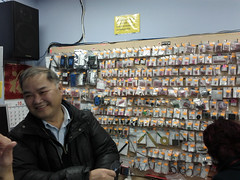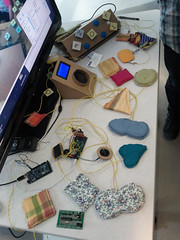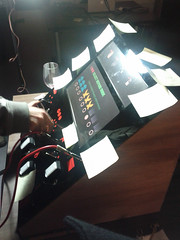Happenings in Toronto
— October 31st, 2011

Just got back from Toronto, where I attended events at Toronto Digifest and TIFF Nexus. I was very impressed with all the interesting work happening there. I gave a presentation at DigiFest on Arduino, Physical Computing and Mass Participation (PDF, 25.9MB). At TIFF Nexus I was a commentator on the Peripherals Initiative along with Steve Daniels, John Bouchard, and Emilie McGinley.
On Thursday Kate Hartman took me to visit her Social Body lab at OCAD University. After that, we went to visit Lawrence at Creatron, a local retailer of electronics parts for hobbyists. I am envious of the electronics hackers in Toronto because of that store! Lawrence carries all the stuff I and my students buy online all the time: microcontrollers, modules from online retailers like Adafruit and Spark Fun and individual components like resistors, LEDs, and much more. He told me he works directly with his friends and colleagues in Hong Kong to import parts directly, so as to cut out the middleman and keep prices low. I tried to talk him into opening a store in New York City as well. We need you in NYC, Lawrence!
The Digifest talk was a great experience, thanks to organizers Luigi Ferrara, Nick Crampton, Samantha Fraser and the rest of the Digifest TO team. Thanks also to Maria Grazia Mattei and Giulia Capodieci of Meet the Media Guru for inviting and hosting me as well.Thanks to all the folks in the audience who asked really great questions as well.
On Friday Steve, John, and Ramona Pringle gave me a tour of Ryerson’s Digital Media facilities. Ryerson’s just finishing off the renovation of their Image Arts gallery, which looks like it’ll be a good space for showcasing student and faculty work. The building has a skin of LED panels, all of which are software-controllable, and John and his colleagues have been writing driver software for it. I look forward to seeing images from it when it’s lit up, and seeing what students do with it when they get their hands on it. We also took a tour of Ryerson’s Digital Media Zone business incubator, and had a great chat with Jason Nolan about the work EDGElab is doing in assistive design. He showed me an Arduino-based keyboard emulator designed by Vlad Cazan that was built to help a young girl with 1P36 deletion syndrome to communicate.
The TIFF Nexus peripherals event featured five hardware and software game hacks developed by teams who signed up for the event. Sadly, I only got to play two of them before I had to leave. Button Masher (again featuring Vlad and Alex Bethke of Golden Gear Games) is made up of two panels of hexagons of large light-up buttons, a sort of 21st century wack-a-mole, but with a variety of different games you can play on it, from snake trap to an Othello-like board game. Analog Defender, by Alexander Martin and Patrick Dinnen is a space game in the style of Space Invaders, but with a control panel made of great chunky industrial control knobs and buttons. The interface is pretty complicated but unlabled, and the developers encouraged players to label the controls with post-it notes as a form of social labeling. I loved the way you end up collaborating with people who played before you as a result.
It was a great trip, and it was wonderful to see so many folks using Arduino in really creative ways in Toronto.


